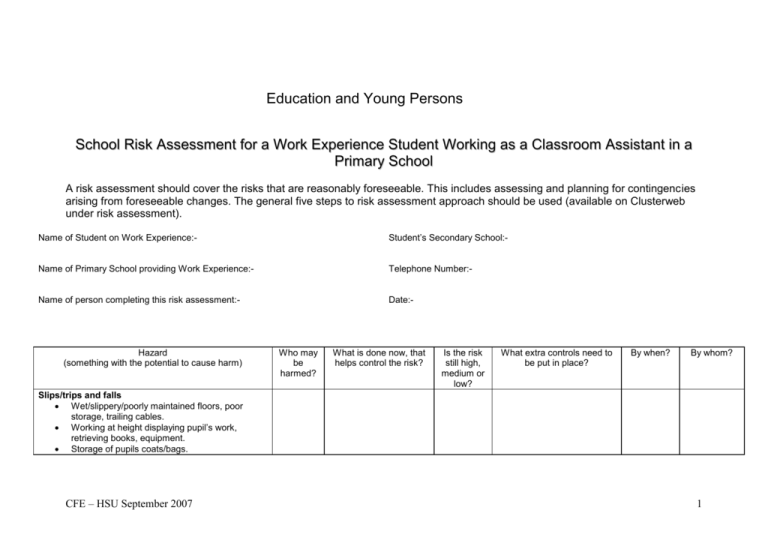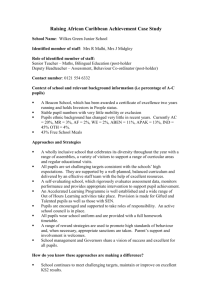Risk assessment for work experience in a school
advertisement

Education and Young Persons School Risk Assessment for a Work Experience Student Working as a Classroom Assistant in a Primary School A risk assessment should cover the risks that are reasonably foreseeable. This includes assessing and planning for contingencies arising from foreseeable changes. The general five steps to risk assessment approach should be used (available on Clusterweb under risk assessment). Name of Student on Work Experience:- Student’s Secondary School:- Name of Primary School providing Work Experience:- Telephone Number:- Name of person completing this risk assessment:- Date:- Hazard (something with the potential to cause harm) Who may be harmed? What is done now, that helps control the risk? Is the risk still high, medium or low? What extra controls need to be put in place? By when? By whom? Slips/trips and falls Wet/slippery/poorly maintained floors, poor storage, trailing cables. Working at height displaying pupil’s work, retrieving books, equipment. Storage of pupils coats/bags. CFE – HSU September 2007 1 Manual Handling Injuries Handling stationery, audio visual equipment, pupils. Excessive bending stretching and reaching. Impact or contact with objects and equipment Being struck by falling objects, books or equipment from high level storage. Contact from play equipment at break and lunchtimes i.e. footballs. Contact with contents of hot glue gun. Trapping fingers. Contact with Hot water. Impact from use/contact with machinery/vehicles Use of photocopying machine. Use of computers including laptops and tablets. Conflict with traffic Any other machinery and/or tools. Use of Electrical Equipment Electric shock. Static shock. Damaged equipment. Poorly Maintained electrical equipment. Exposure to Hazardous substances and environments Use of chemicals including cleaning chemicals. Noise and vibration. Contact with bodily fluids. Exposure to infectious diseases. Fire or Explosion Emergency plan. Smoking. CFE – HSU September 2007 2 Violence and assault (verbal and/or physical) Pupils with challenging behaviour. Violence from pupil/staff. Verbal threats. List of Induction process for work experience Signing in book; welfare facilities; fire evacuation procedures; use of telephones and computers; first aid; accident reporting, security; Prevention and Management of violence; dress code. Other Health and Safety Topics to consider Site specific hazards; pupils with special educational needs; Defect reporting, manual handling; Display screen equipment; PE activities including swimming; Supporting pupils with medical needs; Pupil toileting arrangements; Universal hygiene precautions. Additional Support Material Health, Safety and Welfare assessment for Work Experience Placements – a good practice guide – Version 2 February 2007 – available on Clusterweb under Work Experience. CFE – HSU September 2007 3









![afl_mat[1]](http://s2.studylib.net/store/data/005387843_1-8371eaaba182de7da429cb4369cd28fc-300x300.png)

